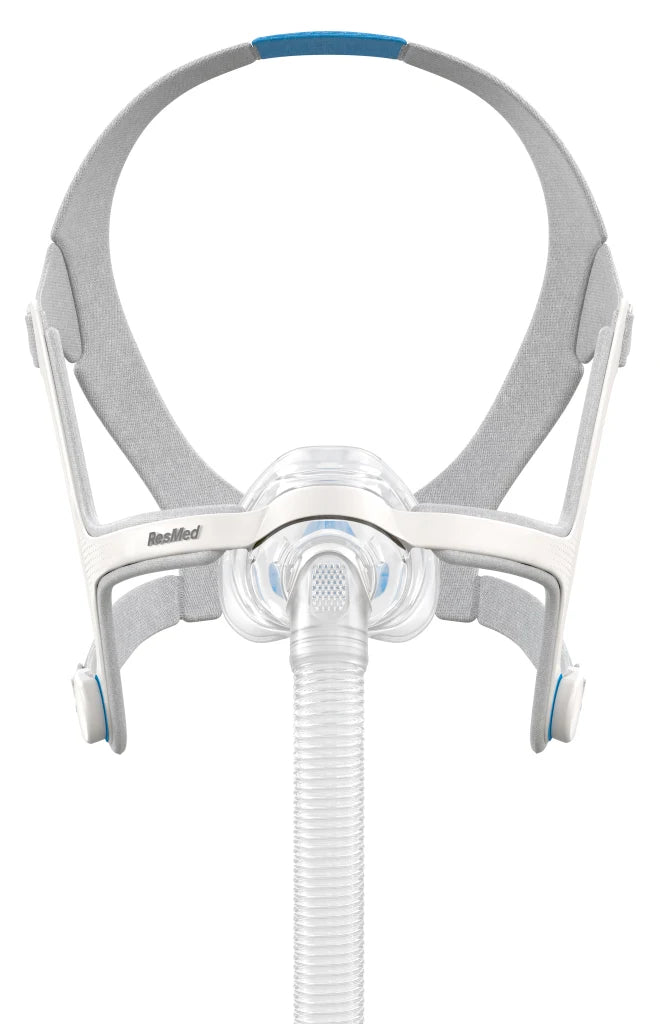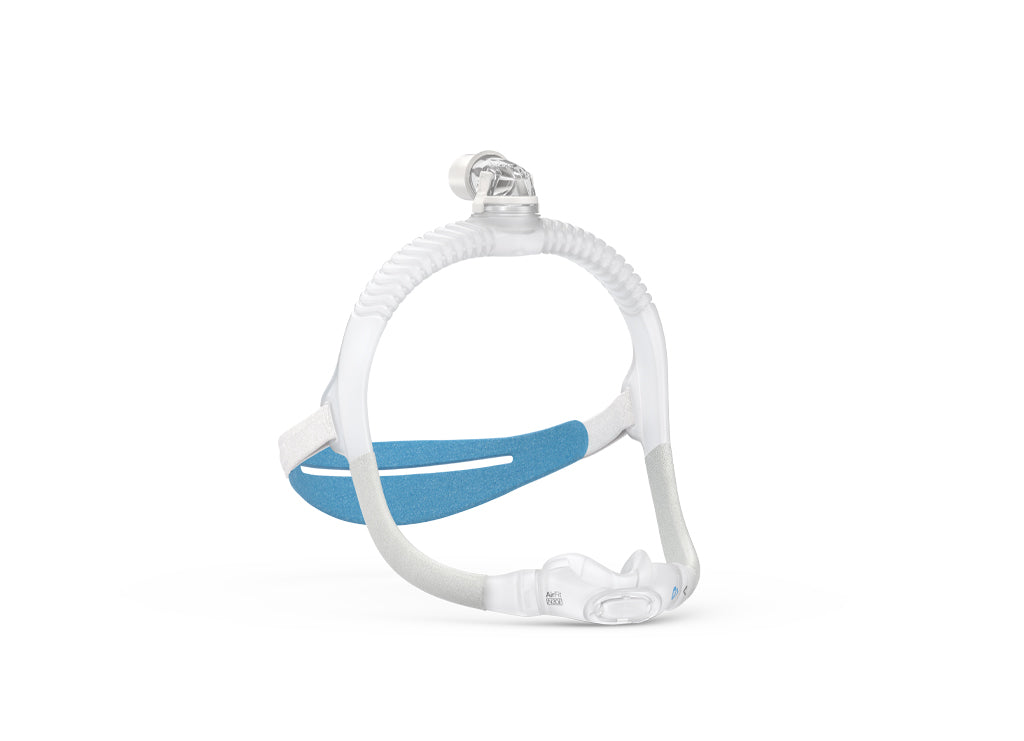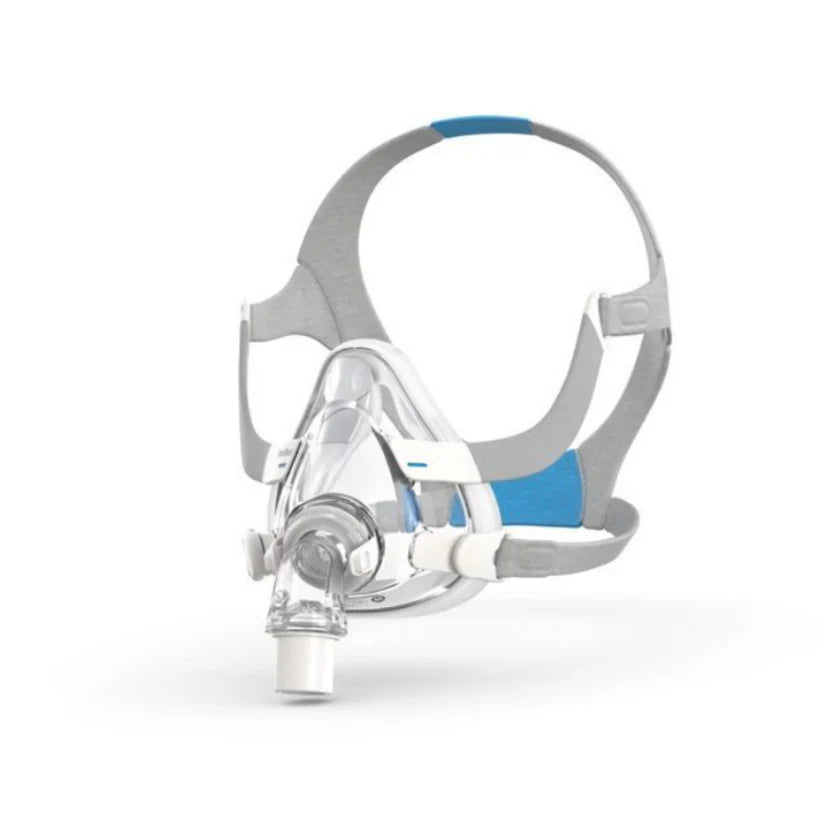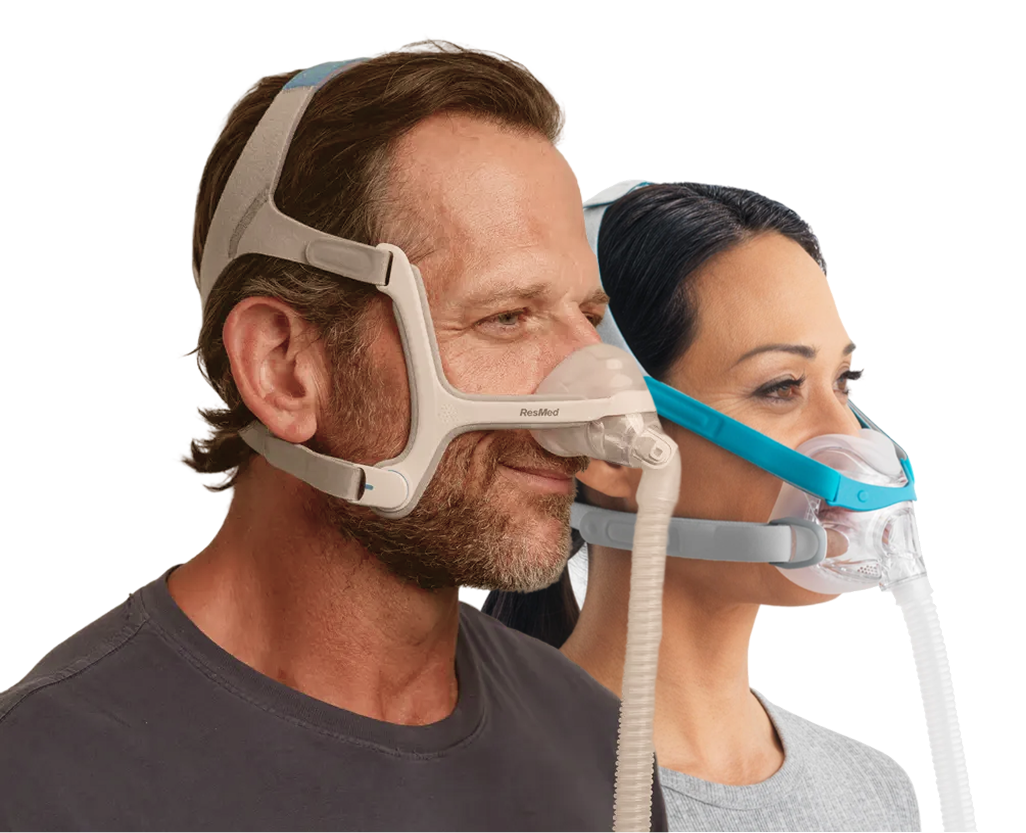

Sleep apnea treatments
Sleep apnea is a common sleep disorder that can harm your health if left untreated. Thankfully, sleep apnea treatments are available to improve your sleep quality, helping you wake up feeling refreshed and energized. Options like CPAP, BiPAP, ASV, and Diaphragmatic Pacing work to keep your airway open during sleep. With CPAP Discount Warehouse, let's delve into how these treatments work and who can benefit most from them.
How to treat obstructive sleep apnea?
Obstructive Sleep Apnea treatments focus on keeping the airway open and resolving the factors causing obstruction to ensure steady and easy breathing throughout the night.
-
If left untreated, obstructive sleep apnea can contribute to weight gain. Losing weight, especially if you're overweight, can help manage sleep apnea and improve your overall health.
Stopping smoking and cutting down on alcohol intake, especially in the evening, can also alleviate obstructive sleep apnea. -
Continuous Positive Airway Pressure (CPAP) is a common and effective therapy for managing obstructive sleep apnea (OSA). It works by delivering a steady stream of pressurized air through a mask worn over the nose, or both the nose and mouth, during sleep. This airflow maintains an open airway, preventing obstructions and ensuring uninterrupted breathing. As a result, CPAP therapy improves sleep quality, reduces daytime fatigue and sleepiness, and lowers the risk of serious health conditions such as high blood pressure, heart disease, and stroke.
A CPAP device typically consists of three key parts:
Air Blower: Generates a continuous flow of air at a set pressure level to keep the airway open.
Tube: Transfers the pressurized air from the blower to the mask.
CPAP Mask: A mask worn over the nose, or both the nose and mouth, to deliver the air. There are three main types of masks designed to suit individual preferences:
- Nasal Masks: Cover the nose.
- Nasal Pillow Masks: Fit directly under the nostrils.
- Full-Face Masks: Cover both the nose and mouth.
This treatment not only helps regulate breathing but also enhances overall health and quality of life by mitigating the effects of sleep apnea.
-
Bi-level Positive Airway Pressure (BiPAP) is a medical device designed to treat both obstructive and central sleep apnea. While it operates similarly to Continuous Positive Airway Pressure (CPAP), Bi-PAP machines offers a key distinction: it delivers two different pressure levels to support breathing.
- Inspiratory Positive Airway Pressure (IPAP): A higher pressure to aid inhalation and help keep the airways open.
- Expiratory Positive Airway Pressure (EPAP): A lower pressure during exhalation to reduce airway resistance and ease breathing out.
BiPAP machines automatically adjust these pressure levels throughout the night, aligning with the patient’s breathing patterns. This feature enhances comfort, particularly for individuals who struggle with CPAP therapy. However, BiPAP devices tend to be bulkier and more costly than CPAP machines.
When considering a purchase, patients should evaluate their medical needs and consult a healthcare professional to ensure the most suitable choice.
-
An alternative to CPAP therapy is a specially designed custom mouthguard, like the Narval™ CC. It works by holding your bottom jaw forward, creating more space behind your tongue.
The Narval™ is effective in reducing snoring and treating mild to moderate obstructive sleep apnea. For individuals with severe obstructive sleep apnea who struggle with CPAP, trying a Narval™ mouthguard may be recommended. -
If CPAP and/or mandibular therapy have not been effective for you, your surgeon may recommend one or more invasive surgical options as a last resort for treating sleep apnea.
Somnoplasty reduces soft tissue at the back of your throat. Sinus surgery can alleviate snoring caused by a blocked nose. Removing tonsils and adenoids may improve airflow if they are obstructing the airway. Surgery to trim tissue from the soft palate or uvula can alleviate breathing issues during sleep.
Laser treatment induces scar tissue formation on the soft palate, which becomes stiff as it heals. -
Hypoglossal Nerve Stimulation (HGNS) is an innovative treatment that involves an implantable device to stimulate the hypoglossal nerve. When a sensor placed in the chest detects breathing interruptions or airway obstruction, it signals a pulse generator to deliver gentle electrical pulses to the hypoglossal nerve. This stimulation activates the tongue and throat muscles, causing them to contract and move forward, which helps keep the airway open.
This therapy reduces sleep apnea symptoms such as snoring and daytime fatigue, lowers the Apnea-Hypopnea Index (AHI), and enhances sleep quality, offering significant improvement for patients with sleep apnea.
The HGNS device consists of three main parts:
- Respiratory Sensor: Tracks the patient’s breathing patterns to identify when stimulation is required.
- Nerve Stimulator: Implanted beneath the skin near the hypoglossal nerve.
- Pulse Generator: Produces gentle electrical pulses to activate the tongue and throat muscles.
Suitable Candidates for HGNS:
- Individuals with moderate to severe obstructive sleep apnea (OSA).
- Patients who have not responded well to CPAP or other treatment options.
- Those whose throat anatomy is not suitable for surgical interventions.
-
Tonsillectomy and Adenoidectomy are surgical procedures to remove the tonsils and adenoids, which are immune system tissues. The tonsils are located at the back of the throat, while the adenoids are positioned behind the nasal cavity. These surgeries are effective treatments for obstructive sleep apnea caused by enlarged tonsils or adenoids, particularly in children.
Both procedures are performed under general anesthesia and typically take 30 to 60 minutes. A tonsillectomy involves removing the tonsils through an incision in the throat, while an adenoidectomy removes the adenoids through the mouth or nasal cavity, depending on the technique used.



How to Treat Central Sleep Apnea
Central sleep apnea affects up to 20% of those with sleep apnea. Unlike obstructive sleep apnea, central sleep apnea occurs when your brain fails to send proper signals to the muscles that control breathing. This causes you to stop breathing for 10 seconds or more while asleep. Eventually, reduced oxygen levels prompt you to take a breath.
-
Adaptive Servo-Ventilation (ASV) is an advanced therapy specifically designed to treat central sleep apnea (CSA) and complex sleep apnea. This device uses sensors to continuously monitor the patient’s breathing patterns and oxygen levels, identifying irregularities such as shallow breathing or apnea episodes.
When abnormal breathing is detected, the ASV machine automatically adjusts the inspiratory (IPAP) and expiratory (EPAP) pressure with precision to prevent apnea events. During normal breathing, the device reduces pressure levels to maximize comfort, promoting a stable and restorative sleep.
ASV offers a highly flexible and effective solution for improving sleep quality, reducing fatigue, and minimizing risks associated with sleep apnea. It is especially beneficial for patients who do not respond well to other sleep apnea treatments like CPAP or BiPAP.
-
Oxygen Therapy is a treatment for sleep apnea that provides supplemental oxygen to patients with low blood oxygen levels during sleep. It is particularly beneficial for those with central sleep apnea (CSA) or complex sleep apnea (CompSA), where irregular breathing can cause oxygen levels to drop. By maintaining proper oxygen saturation, the therapy ensures sufficient oxygen delivery to vital organs throughout the night.
Oxygen is typically delivered via a nasal cannula, face mask, or other specialized devices, depending on the patient’s needs and the severity of their condition. Oxygen therapy is often combined with other treatments, such as CPAP or BiPAP, to offer comprehensive care for managing sleep apnea.
-
Diaphragmatic Pacing is similar to Hypoglossal Nerve Stimulation (HGNS) and Inspire Therapy as all involve implanting a device that uses electrical impulses to stimulate muscles. However, in diaphragmatic pacing, the sensor device is implanted near the diaphragm or vagus nerve. This stimulation helps regulate and maintain a stable breathing rhythm, making it particularly effective for patients with central sleep apnea (CSA) or complex sleep apnea (CompSA).
-
Medications are not a standalone treatment for sleep apnea but can complement other therapies like CPAP or surgery. Certain medications help manage symptoms associated with sleep apnea, such as excessive daytime sleepiness, while others address related conditions like nasal congestion. All medications should be prescribed and supervised by a doctor to ensure safe and effective use.
Lifestyle and home remedies
-
Weight Loss
Research indicates that weight loss can significantly alleviate sleep apnea symptoms. Reducing excess fat around the neck and chin decreases pressure on the airway, improving airflow and supporting sleep apnea treatment, particularly for obstructive sleep apnea (OSA).
-
Changing Sleep Position
Sleeping position has a direct impact on breathing during sleep. Individuals with sleep apnea are encouraged to sleep on their side or with their head elevated to naturally open the airway and reduce obstruction risk. Avoid lying on your back, as this position can cause the tongue and throat tissues to collapse, blocking the airway.
-
Avoiding Alcohol and Sedatives
Alcohol and sedatives relax throat muscles, including those controlling the airway, increasing the likelihood of airway collapse and obstruction. These substances also inhibit the central nervous system, disrupting brain signals that regulate breathing, exacerbating central sleep apnea (CSA) symptoms. Avoiding alcohol and sedatives can help reduce airway obstruction and improve sleep apnea treatments
-
Quitting Smoking
Smoking inflames and irritates the respiratory mucosa, leading to increased mucus production and narrowing of the airway. This hinders airflow, increasing the risk of obstruction and sleep apnea. Quitting smoking reduces inflammation, clears the airways, and enhances breathing quality during sleep.
Online Sleep Assessment
Are You at Risk?
Suspect you might have a sleep disorder like sleep apnea? Find out how to improve your sleep with a quick online assessment. Take a few minutes to see if you're at risk.
Start assessment
If you are seeking for professional consultation. Please visit our CLM Sleep, our partnership Treatment Programmes providers.
Managing Mild Sleep Apnea Without CPAP
Mild sleep apnea is characterized by having between 5 and 14 breathing pauses every hour. If you have mild sleep apnea and no other medical conditions or risk factors, you can consider managing it with lifestyle changes and regular monitoring.
In addition to achieving your ideal weight, quitting smoking, and reducing alcohol intake, you can also consider using a humidifier to reduce congestion in your airways and keep your nose clear. Essential oils like thyme, rose, or eucalyptus, known for their anti-inflammatory effects, can be beneficial if you don’t mind their scent.
If you continue to experience symptoms despite trying these methods, it’s a good idea to speak with one of our friendly consultant to discuss your next steps.
Visit a CDW store.
 Liquid error (sections/image-banner line 89): invalid url input
Liquid error (sections/image-banner line 89): invalid url input

